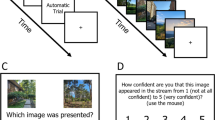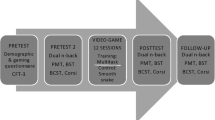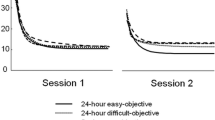Abstract
This study assessed the influence of sensorimotor experiences, predicated on role specificity, on visual search patterns and performance judgments in three experts in gymnastics (i.e., gymnast, coach and judge). They observed video recordings of six trials demonstrating three different gymnastic skills, while their visual behaviors were recorded with the ASL SE5000 system. Participants judged the quality of the gymnastic skill, identifying execution errors after each trial based on the Code of Points employed by the International Gymnastics Federation (2014). Results showed that the gymnast participant developed a different perceptual pattern compared to the other participants, but no differences were observed between the judge and coach. Additionally, the judge reported higher judgement accuracy (53.47%), followed by the coach (40.33%) and gymnast (37.58%). These data suggested that the participants fixated on different information sources when making judgements on performance scores, based on their different previous visual and motor experiences to evaluate gymnastic skills.


Similar content being viewed by others
References
Afonso, J., Garganta, J., Mcrobert, A., Williams, A. M., & Mesquita, I. (2012). The perceptual cognitive processes underpinning skilled performance in volleyball: Evidence from eye-movements and verbal reports of thinking involving an in situ representative task. Journal of Sports Science and Medicine, 11(2), 339–345.
Aglioti, S. M., Cesari, P., Romani, M., & Urgesi, C. (2008). Action anticipation and motor resonance in elite basketball players. Nature Neuroscience, 11, 1109–1116.
Allard, F., Parker, S., Deakin, J., & Rodgers, W. (1993). Declarative knowledge in skilled motor performance: Byproduct or constituent? In J. L. Starkes & F. Allard (Eds.), Cognitive issues in motor expertise (pp. 95–108). Amsterdam: Elsevier.
Bard, C., Fleury, M., Carriere, L., & Halle, M. (1980). Analysis of gymnastics judges’ visual search. Research Quarterly for Exercise and Sport, 51, 267–273.
Baron, J. (2004). Normative Models of Judgment and Decision Making. In D. J. Koehler & N. Harvey (Eds.), Blackwell Handbook of Judgment and Decision Making (pp. 19–36).
Behrmann, M., & Ewell, C. (2003). Expertise in tactile pattern recognition. Psychological Science, 14, 480–492. doi:10.1111/1467-9280.02458.
Cañal-Bruland, R., van der Kamp, J., & van Kesteren, J. (2010). An examination of motor and perceptual contributions to the recognition of deception from others’ actions. Human Movement Science, 29, 94–102.
Ericsson, K. A., & Williams, A. M. (2007). Capturing naturally occurring superior performance in the laboratory: Translational research on expert performance. Journal of Experimental Child Psychology: Applied, 13, 115–123.
Ericsson, K. A., Krampe, R., & Tesch-Römer, C. (1993). The role of deliberate practice in the acquisition of expert performance. Psychological Review, 100(3), 363–406.
Goldman, A., & de Vignemont, F. (2009). Is social cognition embodied? Trends in Cognitive Sciences, 13(4), 154–159.
Hancock, D. J., & Ste-Marie, D. (2013). Gaze behaviors and decision making accuracy of higher-and lower-level ice hockey referees. Psychology of Sport and Exercise, 14(1), 66–71.
Hars, M., & Calmels, C. (2007). Observation of elite gymnastic performance: Processes and perceived functions of observation. Psychology of Sport and Exercise, 8(3), 337–354.
Hecht, H., Vogt, S., & Prinz, W. (2001). Motor learning enhances perceptual judgment: A case for action-perception transfer. Psychological Research, 65(1), 3–14.
Hodges, N. J., Williams, A. M., Hayes, S. J., & Breslin, G. (2007). What is modelled during observational learning? Journal of Sports Sciences, 25(5), 531–545.
International Gymnastics Federation. (2014). Code of points-Women’s artistic gymnastics. Lausanne Switzerland: Author.
Jacoby, L. J., Debner, J. A., & Hay, J. F. (2001). Proactive interference, accessibility bias, and process dissociations: Valid subjective reports of memory. Journal of Experimental Psychology. Learning, Memory, and Cognition, 27(3), 686–700.
Jeannerod, M. (2001). Neural simulation of action: A unifying mechanism for motor cognition. NeuroImage, 14, 103–109.
Klein, G. (1998). Sources of power how people make decisions. Cambridge: MIT Press.
Luis, V., Reina, R., Sabido, R., & Moreno, F. J. (2015). Diferencias en el comportamiento visual y motor de tenistas en laboratorio y en pista. Revista Latinoamericana de Psicología, 47(2), 136–145.
MacMahon, C., & Plessner, H. (2008). The sport officials in research and practice. In D. Farrow, J. Baker, & C. MacMahon (Eds.), Developing sport expertise. Researchers and coaches put theory into practice (pp. 172–192). Abingdon, Oxon: Routledge.
MacMahon, C., Helsen, W. F., Starkes, J. L., & Weston, M. (2007). Decision-making skills and deliberate practice in elite association soccer referees. Journal of Sports Sciences, 25, 65–78.
MacMahon, C., Starkes, J. L., & Deakin, J. (2009). Differences in processing of game information in basketball players, coaches and referees. International Journal of Sport Psychology, 40, 403–423.
Mann, D. T., Williams, A. M., Ward, P., & Janelle, C. M. (2007). Perceptual-cognitive expertise in sport: A meta-analysis. Journal of Sport and Exercise Psychology, 29(4), 457–478.
McPherson, S., & Kernodle, M. (2007). Mapping two new points on the tennis expertise continuum: Tactical skills of adult advanced beginners and entry-level professionals during competition. Journal of Sports Sciences, 25, 945–959.
McPherson, S., & MacMahon, C. (2008). How baseball players prepare to bat: Tactical knowledge as a mediator of expert performance in baseball. Journal of Sport and Exercise Psychology, 30, 755–778.
McPherson, S. L., & Vickers, J. N. (2004). Cognitive control in motor expertise. International Journal of Sport & Exercise Psychology, 2, 274–300.
McRobert, A. P., Williams, A. M., Ward, P., & Eccles, D. W. (2009). Tracing the process of expertise in a simulated anticipation task. Ergonomics, 52(4), 474–483.
Millslagle, D. G., Smith, M. S., & Hines, B. B. (2013). Visual gaze behavior of near-expert and expert fast pitch softball umpires calling a pitch. Journal of Strength & Conditioning Research, 27(5), 1188–1195.
Moreno, F. J., Reina, R., Luis, V., & Sabido, R. (2002). Visual search strategies in experienced and inexperienced gymnastic coaches. Perceptual and Motor Skills, 95, 901–902.
Pizzera, A. (2012). Gymnastic judges benefit from their own motor experience as gymnasts. Research Quarterly for Exercise and Sport, 83(4), 603–607.
Pizzera, A., & Raab, M. (2012). Perceptual judgments of sports officials are influenced by their motor and visual experience. Journal of Applied Sport Psychology, 24(1), 59–72.
Plessner, H., & Haar, T. (2006). Sports performance judgments from a social cognition perspective. Psychology of Sport and Exercise, 7(6), 555–575.
Plessner, H., & Schallies, E. (2005). Judging the cross on rings: A matter of achieving shape constancy. Applied Cognitive Psychology, 19, 1145–1156.
Poplu, G., Baratgin, J., Mavromatis, S., & Ripoll, H. (2003). What kind of processes underlie decision making in soccer simulation? An implicit-memory investigation. International Journal of Sport and Exercise Psychology, 1, 390–405.
Rizzolatti, G., & Craighero, L. (2004). The mirror-neuron system. Annual Review of Neuroscience, 27, 169–192.
Sparrow, W. A., Shemmell, J., & Shinkfield, A. (2001). Visual perception of action categories and the “bowl-trhow” decision in cricket. Journal of Science and Medicine in Sport, 4(2), 233–244.
Ste-Marie, D. M., Valiquette, S. M., & Taylor, G. (2001). Memory-inluenced biases in gymnastic judging occur across different prior processing conditions. Research Quarterly for Exercise and Sport, 72(4), 420–426.
Vickers, J. N. (1988). Knowledge structures of expert-novice gymnasts. Human Movement Science, 7(1), 47–72.
Williams, A. M., & Ericsson, K. A. (2005). Perceptual-cognitive expertise in sport: Some considerations when applying the expert performance approach. Human Movement Science, 24, 283–307.
Williams, A. M., & Ward, P. (2007). Anticipation and decision making: Exploring new horizons. In G. Tenenbaum & R. C. Eklund (Eds.), Handbook of sport psychology (Third ed.). Hoboken, NJ, USA: John Wiley & Sons, Inc.. doi:10.1002/9781118270011.ch9.
Williams, A. M., Davids, K., & Williams, J. G. (1999). Visual perception in action in sports. London: E&FN Spon.
Acknowledgements
The authors would like to thank the Regional Ministry of Economy and Infrastructure of the Board of Extremadura for its contribution to this study through the European Regional Development Fund.
Author information
Authors and Affiliations
Corresponding author
Ethics declarations
This study was not funded by any Institution or Company.
Ethical Approval
All procedures performed in studies involving human participants were in accordance with the ethical standards of the institutional and/or national research committee and with the 1964 Helsinki declaration and its later amendments or comparable ethical standards.
Informed Consent
Informed consent was obtained from all individual participants included in the study.
Conflict of Interest
Authors declare that we have no conflict of interest.
Rights and permissions
About this article
Cite this article
Luis del Campo, V., Espada Gracia, I. Exploring Visual Patterns and Judgments Predicated on Role Specificity: Case Studies of Expertise in Gymnastics. Curr Psychol 37, 934–941 (2018). https://doi.org/10.1007/s12144-017-9572-1
Published:
Issue Date:
DOI: https://doi.org/10.1007/s12144-017-9572-1




